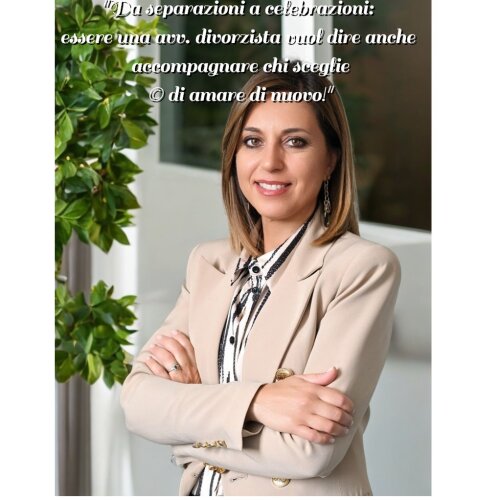Best Collaborative Law Lawyers in Formia
Share your needs with us, get contacted by law firms.
Free. Takes 2 min.
Free Guide to Hiring a Family Lawyer
List of the best lawyers in Formia, Italy
About Collaborative Law in Formia, Italy
Collaborative Law is an alternative dispute resolution (ADR) method that enables parties to resolve conflicts in a cooperative, non-adversarial manner. In Formia, a town in the Lazio region of Italy, Collaborative Law is especially utilized in family law matters such as divorce, child custody, and property division, but it can be applied in a variety of civil disputes. The process involves both parties working together with their respective lawyers and, if necessary, other professionals such as mediators, financial consultants, or psychologists, to reach a mutually acceptable agreement outside of the courtroom. The ultimate goal is to avoid litigation, minimize conflict, and create tailor-made solutions that consider the interests of all parties involved.
Why You May Need a Lawyer
Some situations where individuals or families in Formia might require legal help through Collaborative Law include:
- Divorce and separation proceedings, particularly when children or significant assets are involved
- Disputes over child custody, visitation, and support arrangements
- Negotiation and modification of alimony or child support payments
- Division of property and other assets during relationship breakdowns
- Resolving inheritance and succession matters within families
- Addressing business partnership disputes within a family business context
- General civil disputes where both parties wish to avoid court and maintain a cordial relationship
Collaborative Lawyers in Formia are trained to facilitate discussions, negotiate settlements, and ensure that legal documentation meets both local regulations and the parties' personal requirements.
Local Laws Overview
Collaborative Law in Italy, known as "mediazione familiare" when applied to family disputes, is supported by legislative frameworks at both national and regional levels. Italian Law No. 54/2006 and Law Decree No. 132/2014 have encouraged the use of alternative dispute resolution methods in family and civil cases. In the Lazio region, including Formia, collaborative processes are voluntary and require the commitment of both parties and their lawyers to transparency and good faith negotiations.
Key aspects of local application include:
- Both parties must agree in writing to engage in a collaborative process
- Meetings are held in private, and communications during these meetings are confidential
- Lawyers and other professionals involved must be trained in collaborative procedures
- If the process fails, the collaborative lawyers cannot represent the parties in subsequent litigation, ensuring that all participants are genuinely committed to settlement
- Agreements reached through Collaborative Law are formalized and can be made legally binding by submitting them to the relevant court or public authorities for approval
Frequently Asked Questions
What is the difference between Collaborative Law and traditional litigation?
Collaborative Law is a cooperative process where parties work together to resolve disputes without going to court, focusing on mutual agreement rather than legal confrontation. Traditional litigation involves a judge making decisions after adversarial proceedings.
Is Collaborative Law legally recognized in Italy?
Yes, Collaborative Law and other alternative dispute resolution processes are legally recognized in Italy and are encouraged for resolving civil and family disputes efficiently.
Can Collaborative Law be used for issues beyond divorce or family law?
Although most common in family law, Collaborative Law can also be used for civil matters, such as contract disputes or inheritance issues, provided both parties agree to the process.
What professionals might be involved in a collaborative process?
Aside from collaborative lawyers, the process may involve mediators, psychologists, child specialists, financial advisors, or accountants, depending on the nature of the dispute.
Is everything discussed during Collaborative Law meetings confidential?
Yes, all discussions and documents shared during the collaborative process are confidential and cannot be used as evidence if the matter goes to court later.
What happens if we cannot reach an agreement through Collaborative Law?
If no agreement is reached, the collaborative lawyers must withdraw from the case. New lawyers will need to be appointed if the dispute proceeds to litigation.
How long does the Collaborative Law process take?
The timeline varies based on the complexity of the issues and the parties' willingness to cooperate, but collaborative processes often resolve disputes faster than litigation.
Will a Collaborative Law agreement be enforceable in Italy?
Yes, once the agreement is finalized and approved by the court or relevant public authority, it becomes legally binding and enforceable in Italy.
How do I find a qualified Collaborative Lawyer in Formia?
You can seek referrals from the local Bar Association or use directories that list lawyers trained specifically in collaborative and alternative dispute resolution methods.
Can I switch to Collaborative Law if I have already started court proceedings?
In many cases, court proceedings can be paused to allow parties to try collaborative or mediation approaches if both sides agree. Discuss this option with your lawyer.
Additional Resources
If you need more information or assistance regarding Collaborative Law in Formia, consider the following resources:
- The Ordine degli Avvocati di Cassino (Bar Association serving Formia)
- The Italian Association of Family Lawyers (AIAF)
- The National Coordination of Family Mediators (CNMF)
- The local offices of the Giudice di Pace (Justice of the Peace), which provide information on dispute resolution
- Legal aid clinics and family counseling services in Formia
These organizations can help you find trained professionals and offer guidance on the collaborative process.
Next Steps
If you believe Collaborative Law may be suitable for your situation in Formia, consider the following actions:
- Reflect on your goals and your willingness to resolve the dispute cooperatively
- Contact a Collaborative Lawyer or mediator to discuss your case and the suitability of the collaborative approach
- Gather relevant documents and information pertaining to your dispute
- Talk to the other party about the benefits of Collaborative Law and see if they are receptive to participating
- Schedule an initial consultation to understand your rights, obligations, and possible outcomes
Taking these preliminary steps with professional guidance will help you determine if Collaborative Law is the best path for you and enable a smoother, more harmonious dispute resolution process in Formia, Italy.
Lawzana helps you find the best lawyers and law firms in Formia through a curated and pre-screened list of qualified legal professionals. Our platform offers rankings and detailed profiles of attorneys and law firms, allowing you to compare based on practice areas, including Collaborative Law, experience, and client feedback.
Each profile includes a description of the firm's areas of practice, client reviews, team members and partners, year of establishment, spoken languages, office locations, contact information, social media presence, and any published articles or resources. Most firms on our platform speak English and are experienced in both local and international legal matters.
Get a quote from top-rated law firms in Formia, Italy — quickly, securely, and without unnecessary hassle.
Disclaimer:
The information provided on this page is for general informational purposes only and does not constitute legal advice. While we strive to ensure the accuracy and relevance of the content, legal information may change over time, and interpretations of the law can vary. You should always consult with a qualified legal professional for advice specific to your situation.
We disclaim all liability for actions taken or not taken based on the content of this page. If you believe any information is incorrect or outdated, please contact us, and we will review and update it where appropriate.









